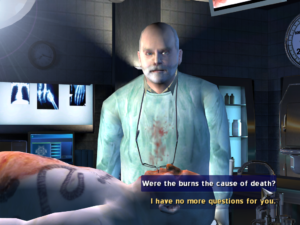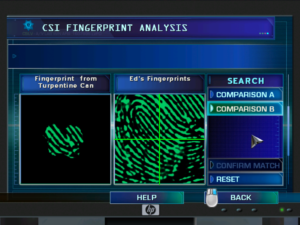CSI: Hard Evidence
 I have been presented with one more Telltale game, and have something of an obligation to give it a whirl. CSI: Hard Evidence is the fourth game based on the TV series CSI: Crime Scene Investigation, and the second produced by Telltale. Now, I’m not a fan of this show. I’ve seen only one episode, which struck me as cartoonishly over-the-top. But unfamiliarity with the source material doesn’t always stop me from playing adaptations. For example, I played the videogame adaptation of The Da Vinci Code specifically so that if anyone asked me if I had read the book or seen the movie, I could reply “No, but I’ve played the videogame.”
I have been presented with one more Telltale game, and have something of an obligation to give it a whirl. CSI: Hard Evidence is the fourth game based on the TV series CSI: Crime Scene Investigation, and the second produced by Telltale. Now, I’m not a fan of this show. I’ve seen only one episode, which struck me as cartoonishly over-the-top. But unfamiliarity with the source material doesn’t always stop me from playing adaptations. For example, I played the videogame adaptation of The Da Vinci Code specifically so that if anyone asked me if I had read the book or seen the movie, I could reply “No, but I’ve played the videogame.”
And, in fact, this CSI adaptation has a certain amount in common with the Da Vinci Code adaptation: an emphasis on hunting for clues, lots of special interfaces, and, most of all, easy puzzles.
My impression may be wrong here: I’ve only completed one of the five cases in the game so far, and you’d expect the first case to be the easiest. But a lot of the easiness comes from user interface features that guide you towards the right things to do. For example, once you’ve gotten every possible clue from an area, a checkbox appears on that area’s icon in the travel interface. Also, the crime lab contains various machines for things like DNA analysis or accessing a fingerprint database, and at any moment, those machines that can be usefully applied to evidence you’ve collected have a special exclamation-point icon on them.
I suppose this is because its target audience isn’t fans of adenture games, but fans of a TV show, and a police procedural, at that: the genre of mystery that’s most about following established procedure and least about brilliant deductions. I’ve talked before about how the payoff in adventure games is the pleasure of figuring things out, of the “moment of realization”. The problem is that this can only come with a certain amount of risk that the player doesn’t figure things out and winds up stuck. This game seems to want to avoid that more than anything else. It’s aiming at an experience similar to the TV show, and no one ever gets stuck watching a TV show. Any brilliant deductions that do occur will be spelled out to the viewer — and so it is here.
 So where is the pleasure in this game? I assume that there’s a certain amount of fantasy appeal, of joining the CSI family and having the people who you’ve come to know and love on the screen patting you on the back and saying “Great job!” whenever you follow procedure correctly. (The game is presented in first-person perspective with an unnamed protagonist, the better to aid player identification.) Obviously I’m missing out on that aspect; these people are strangers to me. The processing of the clues also provides an element of ergodic narrative, reminiscent of Portal (1986), but less linear and punctuated by little challenges such as finding a partial fingerprint in one of several possible matches. But the most interactive part — the part that seems most like a game — is simply finding the various clues and traces in the first place. This aspect of the game feels a lot like finding collectibles in an action game: it rewards being an obsessive completist and looking everywhere. The focus is on thoroughness.
So where is the pleasure in this game? I assume that there’s a certain amount of fantasy appeal, of joining the CSI family and having the people who you’ve come to know and love on the screen patting you on the back and saying “Great job!” whenever you follow procedure correctly. (The game is presented in first-person perspective with an unnamed protagonist, the better to aid player identification.) Obviously I’m missing out on that aspect; these people are strangers to me. The processing of the clues also provides an element of ergodic narrative, reminiscent of Portal (1986), but less linear and punctuated by little challenges such as finding a partial fingerprint in one of several possible matches. But the most interactive part — the part that seems most like a game — is simply finding the various clues and traces in the first place. This aspect of the game feels a lot like finding collectibles in an action game: it rewards being an obsessive completist and looking everywhere. The focus is on thoroughness.
In fact, there’s an interesting mechanism called “throughness points”. Every scene has various hotspots you can inspect, and not all of them actually contain clues. But whenever you inspect something that doesn’t hold a clue, you get a thoroughness point instead, and these are taken into account in your evaluation at the end of the case. So, with this mechanism, (a) finding new hotspots is never a waste, even if you discover nothing, and (b) you always know if the place you just clicked on contains a clue, because those are the spots without thoroughness points. More interestingly, your stats for the case indicate how many thoroughness points you haven’t found yet, which turns thoroughness points themselves into a kind of collectible — one that consists precisely of an absence of anything to collect.
Disclosure: I received this game for free from Telltale Games.
 Comments(1)
Comments(1)
I haven’t played that particular one, but did investigate CSI 3 (the first in 3D and presumably also Telltale’s first crack at the series), after having finished the first game and puttered out somewhere in the middle of CSI 2: Dark Motives. I’ve never once seen the show, but there’s a certain rudimentary appeal to poking around discovering and then analyzing clues, even if it’s mostly dead simple. And of course there’s the story being told.
If it’s anything like CSI 3, you can turn off a lot of the little aids. For me I suspect this would mostly create a more frustrating game, not a more fun one, since the aids are mostly intended to point out that you have in fact thoroughly explored a given option, and do not affect the general lack of intensive puzzling.
I quit CSI 3 after running into two separate, immensely arbitrary dead ends created by bugs, requiring a complete restart of the first case each time (due to the game’s save system). Not enough fun for that kind of frustration.